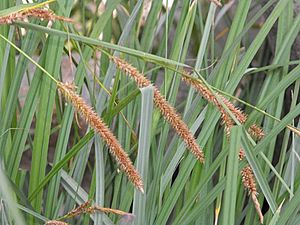San Diego sedge facts for kids
Quick facts for kids San Diego sedge |
|
|---|---|
 |
|
| Conservation status | |
| Scientific classification | |
| Kingdom: | |
| (unranked): | |
| (unranked): | |
| (unranked): | |
| Order: | |
| Family: | |
| Genus: | |
| Species: |
C. spissa
|
| Binomial name | |
| Carex spissa L.H.Bailey
|
|
Carex spissa, also known as the San Diego sedge, is a type of plant called a sedge. Sedges are grass-like plants that often grow in wet places. This particular sedge is known for its tall stems and unique appearance, which can sometimes remind people of a cattail.
Discovering the San Diego Sedge
The San Diego sedge is a plant that grows naturally in specific parts of North America. It was first described in 1886 by a scientist named L.H. Bailey.
Where It Grows
You can find the San Diego sedge in the southwestern United States. This includes the states of California, Arizona, and New Mexico. It also grows in the very northern parts of Mexico.
This plant loves wet areas. It often grows in places like seeps, which are spots where water slowly trickles out of the ground. You can also find it along the banks of streams. Sometimes, it even grows in special types of soil called serpentine soils.
What It Looks Like
The San Diego sedge has tall, angled stems that can grow to be more than a meter (about 3 feet) high. These stems are surrounded by long, leathery leaves. The leaves can be green or have a reddish color and can grow up to 1.2 meters (about 4 feet) long.
Flowers and Fruits
The plant produces a long flower cluster called an inflorescence. This part can be up to 80 centimeters (about 31 inches) long. It has many reddish-brown flower spikes. Each of these spikes can hold up to 300 developing fruits. These fruits are how the sedge makes new seeds to grow more plants.
 | Leon Lynch |
 | Milton P. Webster |
 | Ferdinand Smith |


